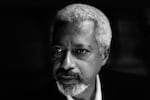
Nobel Prize-winning novelist, Abdulrazak Gurnah
Mark Pringle / OPB
On this episode of “Literary Arts: The Archive Project,” we feature Abdulrazak Gurnah from a Portland Arts & Lectures event in September 2022. He joined us as part of the American launch of his most recent novel “Afterlives.” He had just won the Nobel prize for literature, after a long and distinguished career as a novelist in Britain, thought he was relatively unknown here in the United States.
In his talk, Gurnah describes the rich layers of cultural influence that formed his native Zanzibar, now known as Tanzania, as an international trading hub through the centuries, and his formative decision to move to England as a young man, a decision that would shape his life and his writing.
“Afterlives” is a novel set in on the west coast of Africa during World War I that centers the lives of Africans, not their European colonizers, and their struggles to survive the war and then make sense of their lives in its immediate aftermath.
Encountering the work of a writer for the first time can be thrilling. For most readers here in the United States, the Nobel Prize brought to light not only a writer few of us knew, but one that has been writing profound novels about colonialism and migration for decades. Gurnah’s work is both beautiful and important, giving important and fresh perspective on the recent past, and today.
Bio:
Abdulrazak Gurnah was born in Zanzibar in 1948 and teaches at the University of Kent. He is the author of six novels, including “Paradise,” which was short-listed for the Booker Prize and the Whitbread Award, and “By the Sea,” a Los Angeles Times Book Prize finalist.